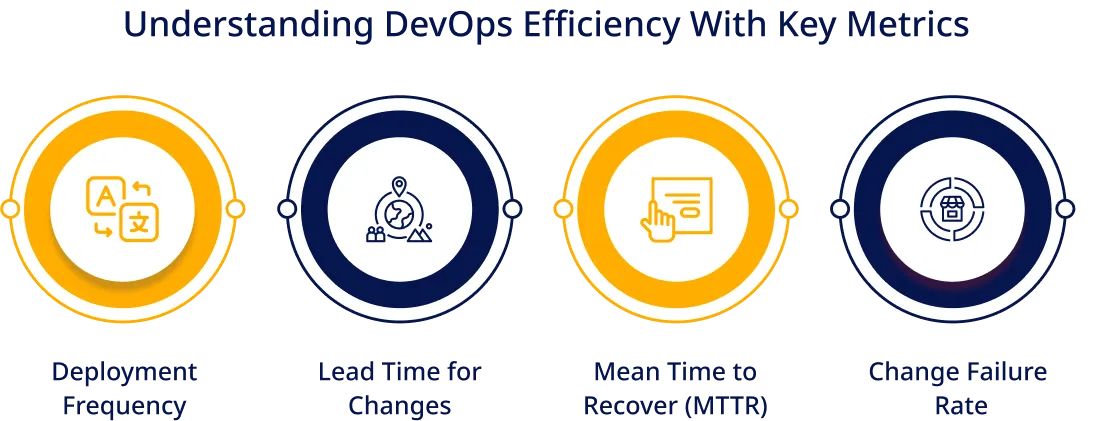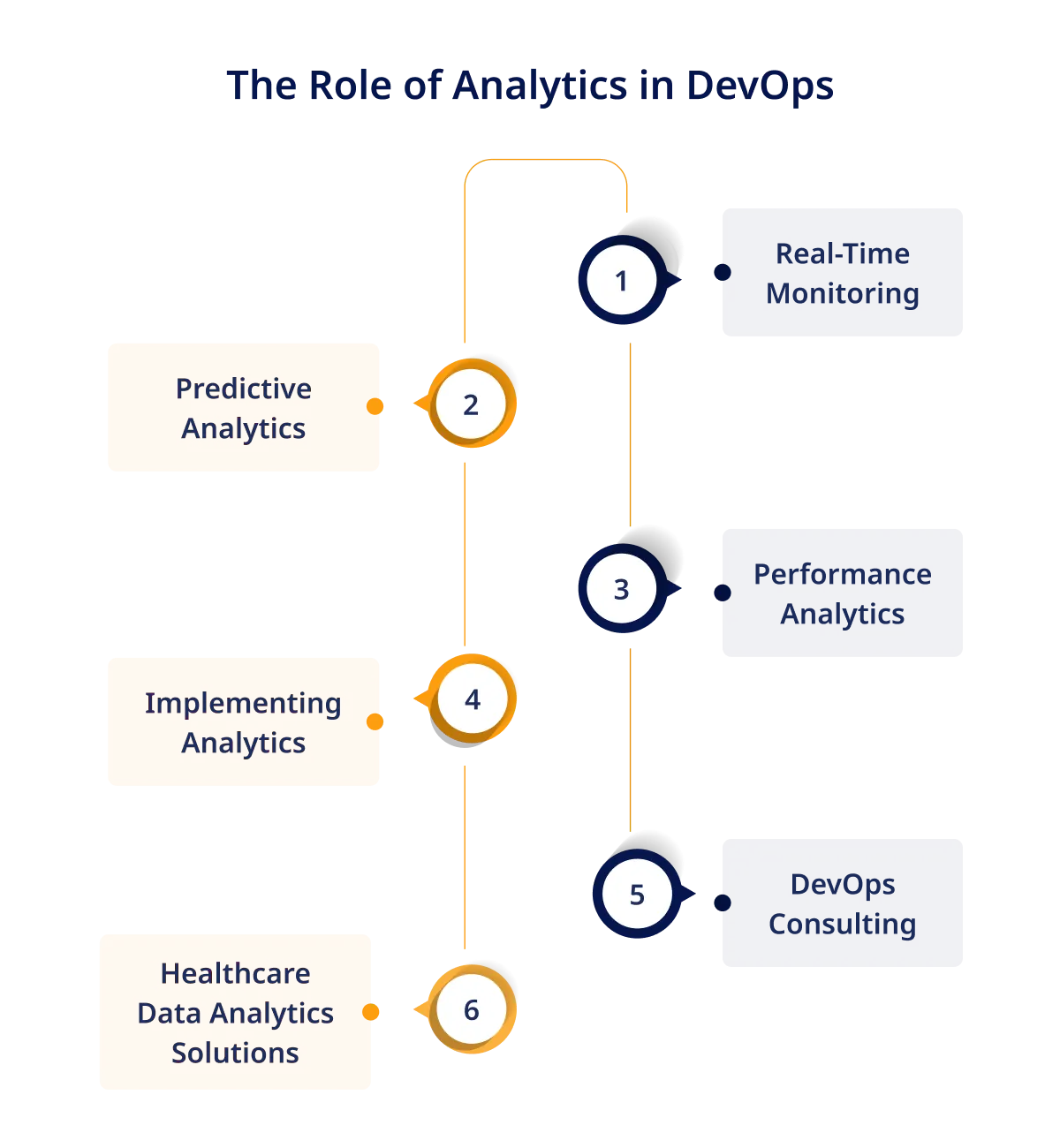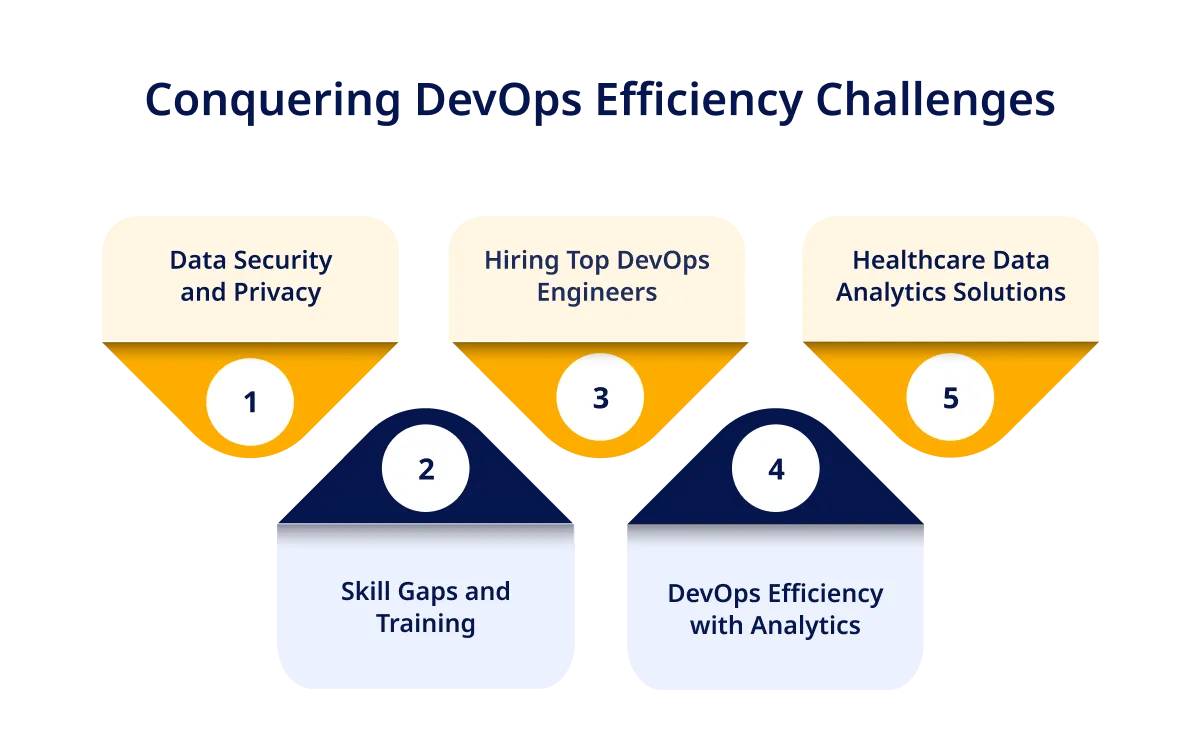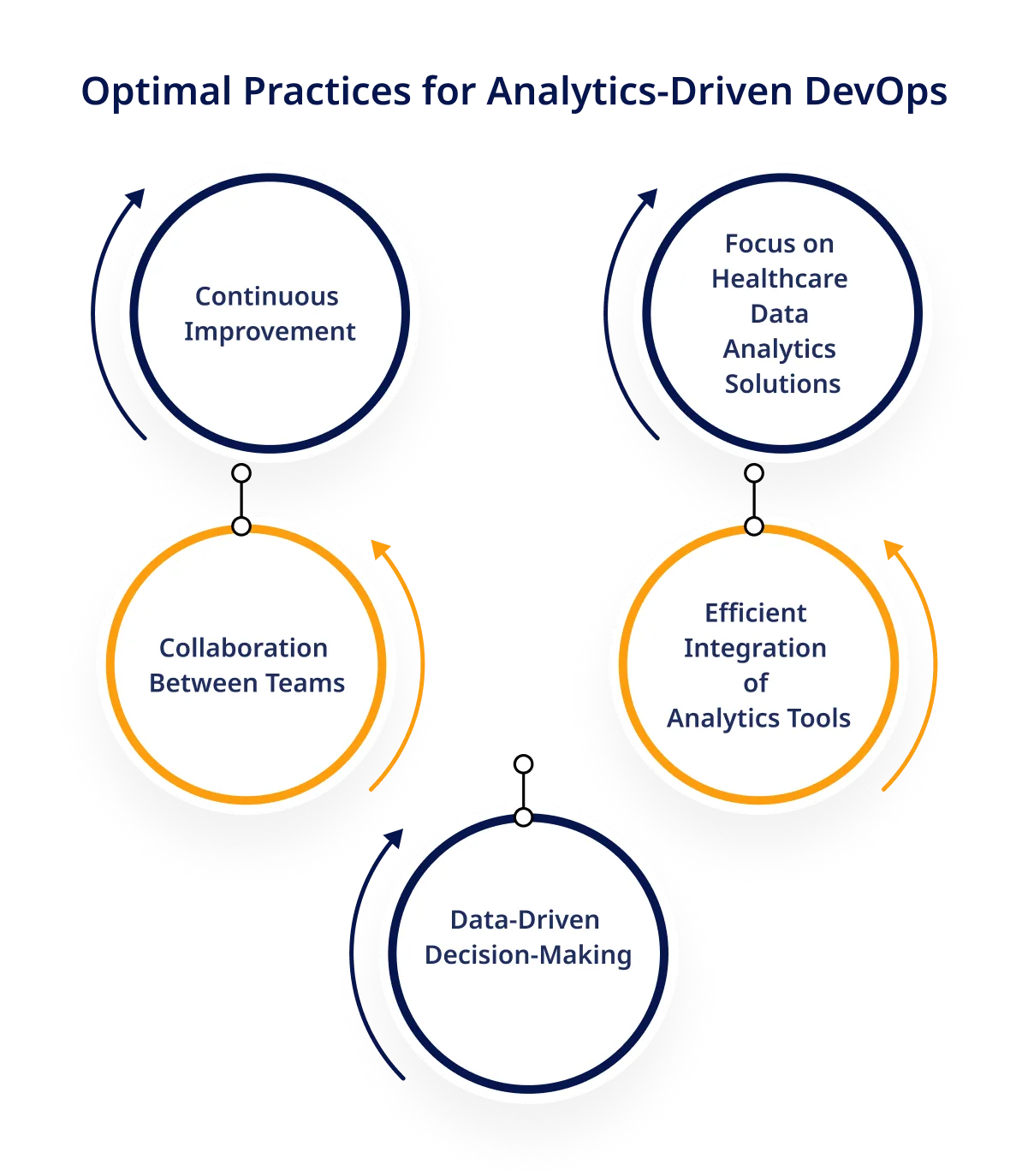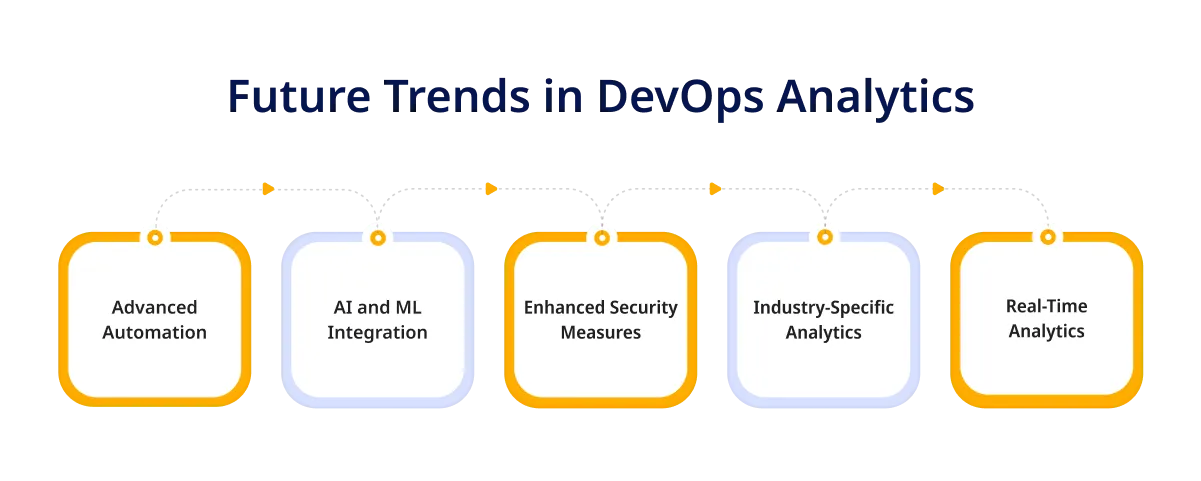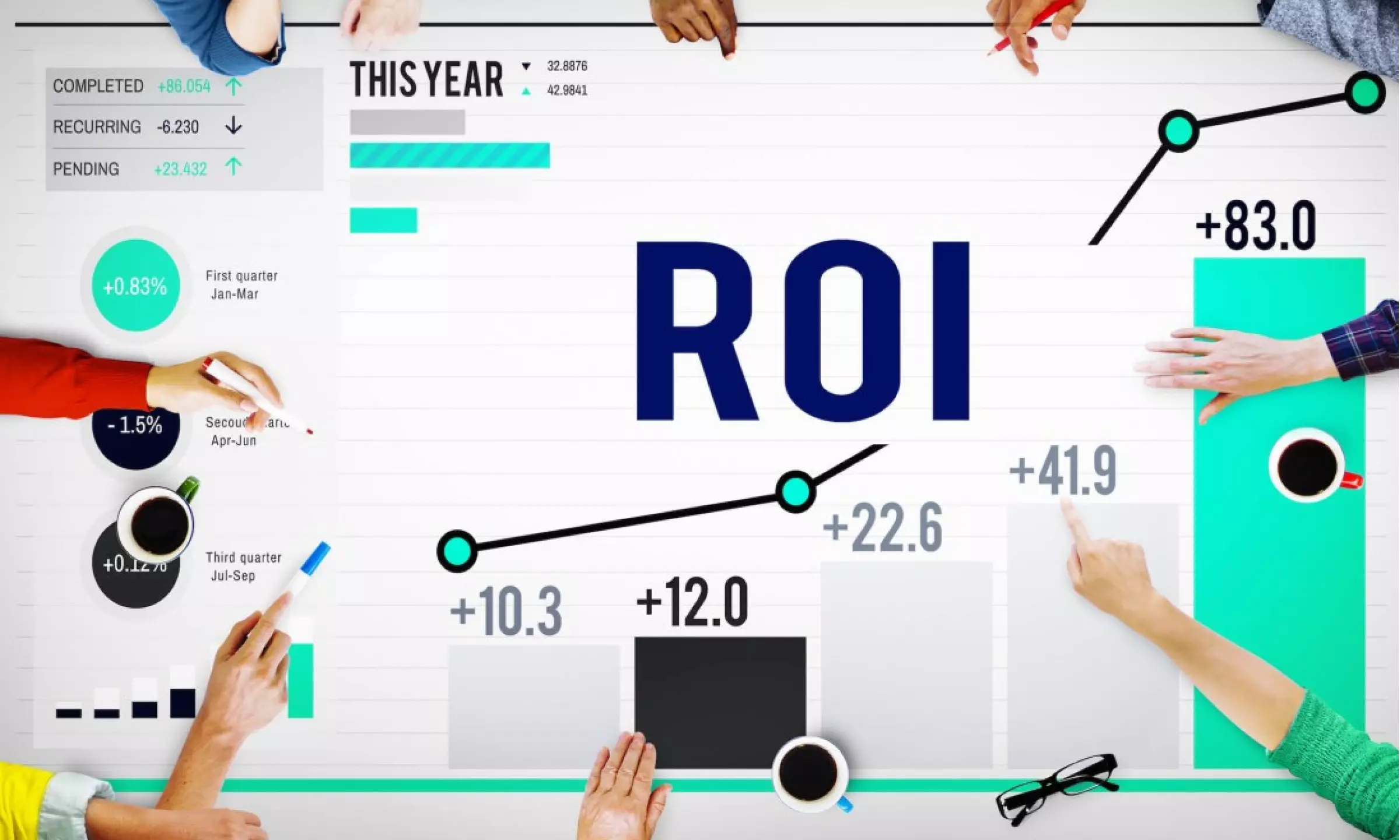DevOps has revolutionized software development and deployment by emphasizing collaboration, automation, and rapid iteration.
But as DevOps maturity and complexity grow, new pain points around tracking outputs and optimizing processes emerge.
Analytics has the potential to enhance visibility and continually improve DevOps efficiency.
According to Gartner, only 12% of organizations have linked their DevOps efforts to measurable business results – indicating immense scope for analytics.
This post will explore the growing intersection of DevOps and analytics while busting myths around impedance mismatches.
You will learn how leading teams ingest metrics across the DevOps lifecycle – from source code commits to production monitoring data – to speed up releases while boosting quality.
Following this guide will position you to build data-driven insight loops that enhance visibility, accelerate deployments, assist planning, and ultimately help DevOps contribute significantly more business value.
Also read: DevOps For Startups: Best Practices And Real-Life Examples
Understanding DevOps Efficiency
In DevOps, efficiency isn’t just a buzzword—the engine keeps the whole process running smoothly.
It enables a streamlined path for your software development and IT operations teams.
Let’s break down the essentials.
1. Key Metrics Matter
- Deployment Frequency: How often are you releasing new features or updates?
- Lead Time for Changes: How quickly do changes go from idea to reality?
- Mean Time to Recover (MTTR): When something breaks, how fast can you fix it?
- Change Failure Rate: What’s the risk of a change causing issues?
2. The Role of Analytics Tools for DevOps
- Real-time Monitoring: Keep an eye on everything as it happens.
- Predictive Analytics: Spot potential problems before they hit you.
- Performance Analytics: Dive deep into system and application performance.
3. Implementing Analytics in DevOps:
- Integration with Tools: Ensure your analytics tools match your existing DevOps tools.
- Data-Driven Decision-Making: Use insights from analytics to steer your decisions.
4. Boosting DevOps Efficiency:
- Continuous Improvement: Keep refining and optimizing. It’s a journey, not a destination.
- Collaboration is Key: Break down walls between your DevOps and analytics teams for smoother operations.
5. DevOps Efficiency with Analytics:
- Feedback Loops: Constantly learn from what’s working and what needs improvement.
- Future Trends: Stay ahead by exploring emerging technologies in analytics.
Boosting DevOps efficiency with analytics involves constant monitoring, predicting issues before they arise, and using data to make informed decisions.
Integration of analytics tools, adherence to best practices, and team collaboration lay the foundation for a streamlined and efficient DevOps process.
ValueCoders offers expert guidance and tailored solutions.
The Role of Analytics in DevOps
Considering the complexities of DevOps, analytics turned out to be a powerful partner, propelling efficiency to new heights.
Let’s understand the crucial role analytics play in the DevOps realm.
Real-Time Monitoring
- Continuous Vigilance: DevOps analytics tools enable continuous monitoring, keeping a watchful eye on every operation in real-time.
- Swift Issue Detection: Instant alerts help detect and address issues as they surface, preventing potential disasters.
Predictive Analytics
- Anticipating Challenges: By measuring DevOps efficiency through predictive analytics, teams can foresee potential challenges based on historical patterns.
- Resource Forecasting: Predictive analytics aids in forecasting resource needs, ensuring optimal utilization without bottlenecks.
Performance Analytics
- In-Depth Analysis: Analytics tools delve into the nitty-gritty of system and application performance, offering a comprehensive understanding.
- Bottleneck Identification: Pinpointing bottlenecks allows for strategic optimization, enhancing overall system efficiency.
Implementing Analytics in DevOps
- Seamless Integration: Integrate analytics tools effortlessly with existing DevOps tools for a streamlined workflow.
- Data-Driven Decisions: Utilize analytics insights to inform decisions, aligning strategies with data-driven precision.
In DevOps, analytics is a guiding light, offering real-time insights, predictive prowess, and performance optimization.
Integrating analytics tools, adherence to best practices, and team collaboration set the stage for a harmonious and efficient DevOps journey.
For those seeking mastery in this realm, consider the expertise of a Data Analytics services company or engage in Data Analytics Consulting services to elevate your DevOps experience.
ValueCoders' services provide a strategic roadmap, enhancing your DevOps efficiency.
Implementing Analytics in DevOps
Bringing analytics into DevOps is like adding a turbo boost to your development and operations collaboration. Here’s how to seamlessly implement analytics and amplify DevOps efficiency:
- Integration with Existing Tools
Ensure a smooth transition by integrating analytics tools for DevOps with your current arsenal. Compatibility is key – ensure your analytics tools work seamlessly with popular DevOps platforms.
- Automation of Analytics Processes
Streamline your workflow by automating analytics processes. Let the tools do the heavy lifting. Embrace efficiency by setting up automated alerts for immediate issue detection.
- Data-Driven Decision-Making
Shift towards a data-centric approach in decision-making. Use analytics insights to steer your DevOps strategies. Leverage the power of analytics to make informed choices, aligning your actions with data-driven precision.
- Hiring Top DevOps Engineers
Building a stellar DevOps team is paramount. Hire top DevOps engineers who understand the synergy between analytics and operations. Look for professionals with a track record of integrating analytics seamlessly into the DevOps lifecycle.
- DevOps Consulting
Engage in DevOps consulting to get expert advice on optimizing your processes with analytics. Leverage the insights of consultants who understand the nuances of enhancing DevOps efficiency with analytics.
- Healthcare Data Analytics Solutions
Tailor analytics solutions to the specific needs of the healthcare sector. Implement healthcare data analytics solutions for a data-driven approach to healthcare DevOps.
Implementing analytics in DevOps isn’t just about adding tools; it’s a strategic move toward a more efficient and insightful development process.
By integrating seamlessly, automating processes, making data-driven decisions, and tapping into top DevOps talent or consulting expertise, you pave the way for a harmonious marriage of analytics and DevOps efficiency.
Customizing solutions in specialized sectors like healthcare ensures that your analytics strategy aligns perfectly with the industry’s unique demands.
ValueCoders ensures a seamless integration of analytics tools.
Overcoming Challenges
In the dynamic realm of DevOps, challenges are inevitable, but they’re also growth opportunities.
Here’s how to overcome hurdles and ensure a smooth journey toward enhanced DevOps productivity with analytics:
- Data Security and Privacy Concerns: Ensure your analytics practices align with industry regulations. Implement secure analytics: Adopt measures to safeguard sensitive data during efficient DevOps data analysis.
- Skill Gaps and Training: Recognize the importance of a proficient analytics team in enhancing DevOps productivity. Training programs: Invest in training initiatives to bridge skill gaps and empower your team in analytics.
- Hiring Top DevOps Engineers: When facing challenges, hiring top DevOps engineers is a strategic move to bring in specialized knowledge.
- A diverse skill set: Look for professionals who can navigate both the intricacies of DevOps and the power of analytics.
- DevOps Efficiency with Analytics: Use challenges as opportunities to enhance your DevOps processes continuously.
- Healthcare Data Analytics Solutions: Overcome challenges in healthcare by customizing analytics solutions to meet specific industry needs.
- Precision in analysis: Ensure that healthcare data analytics solutions provide accurate and insightful information for informed decision-making.
Overcoming challenges in DevOps efficiency with analytics requires strategic planning, skill development, and a commitment to continuous improvement.
By addressing data security concerns, investing in training, hiring top DevOps engineers, and tailoring solutions to specific industries like healthcare, organizations can navigate challenges and pave the way for efficient DevOps data analysis.
Remember, challenges are not roadblocks but stepping stones toward a more resilient and productive DevOps environment.
Best Practices for Analytics-Driven DevOps
Navigating the landscape of Analytics-Driven DevOps demands a strategic approach and adherence to best practices.
Let’s explore the key principles to elevate DevOps efficiency with analytics seamlessly:
- Continuous Improvement: Iterative Analysis: Regularly assess and refine processes through iterative analysis.
- Feedback Loops: Establish feedback mechanisms for continuous learning and improvement.
- Collaboration Between Teams: Breaking Down Silos: Foster collaboration by breaking down silos between DevOps and analytics teams.
- Cross-functional communication: Encourage open communication for streamlined operations.
- Data-Driven Decision-Making: Utilizing Analytics Insights: Leverage analytics insights to inform strategic decisions in DevOps.
- Precision in Actions: Align actions with data-driven precision for optimal results.
Also read: How To Measure Success In Your DevOps Journey?
Efficient Integration of Analytics Tools
- Compatibility with DevOps Tools: Ensure analytics tools seamlessly integrate with popular DevOps platforms.
- Automation of Processes: Streamline workflows by automating analytics processes for efficiency.
Focus on Healthcare Data Analytics Solutions:
- Tailoring Solutions: Customize analytics solutions for the healthcare sector to address specific industry needs.
- Informed Decision-Making: Utilize healthcare data analytics solutions for precise and informed decision-making.
In DevOps, efficiency with analytics, continuous improvement, collaboration, data-driven decision-making, and efficient integration of analytics tools are the cornerstones.
Under the guidance of the best DevOps companies in India, you can implement these practices skillfully at a reasonable cost.
Tailoring solutions to specific industries, such as healthcare, ensures that analytics aligns with the unique demands of each sector.
By incorporating these best practices, organizations can seamlessly navigate the complex intersection of DevOps and analytics, fostering a culture of continuous improvement and innovation.
ValueCoders offers forward-thinking solutions, integrating analytics seamlessly.
Future Trends in DevOps Analytics
As we look forward to the future of DevOps analytics, exciting trends are emerging, promising to redefine the landscape and elevate efficiency to new heights.
1. Advanced Automation
- Smart Workflows: Expect increased automation, not just in processes but in smart, adaptive workflows.
- Predictive Automation: Automation will evolve to predict and preempt issues before they impact operations.
2. AI and Machine Learning Integration
- Predictive Insights: AI and machine learning will offer predictive insights, revolutionizing decision-making.
- Automated Optimization: Expect automated optimization suggestions based on continuous learning.
3. Enhanced Security Measures
- Integrated Security Analytics: Security will become integral to DevOps analytics best practices, ensuring a proactive defense.
- Privacy-Centric Solutions: Future trends will prioritize solutions that align with evolving data privacy regulations.
4. Industry-Specific Analytics Solutions
- Tailored Solutions: DevOps analytics will increasingly cater to industry-specific needs.
- Precision in Decision-Making: Industries like healthcare will benefit from analytics solutions that are finely tuned to their unique requirements.
5. Real–Time Analytics
- Instant Response: Real-time analytics will become even more instantaneous, allowing immediate response to changing conditions.
- Continuous Monitoring: Constant monitoring and analysis will become the norm for DevOps operations. If required, consider having DevOps Monitoring Services for your project.
The future of DevOps analytics is bright, with advanced automation, AI integration, enhanced security measures, industry-specific solutions, and real-time analytics leading the way.
As organizations adapt to these trends, the demand for Data Analytics Consulting services is skyrocketing.
The synergy between DevOps and analytics will streamline operations and pave the way for unprecedented efficiency and innovation.
ValueCoders' services guarantee a perfect fit for your DevOps processes.
Conclusion
As we’ve seen, analytics unlocks immense opportunities for optimization across agile development processes – but only with meaningful metrics implemented strategically.
Rather than encouraging data bloat, carefully determine key performance indicators reflecting health, quality, and business alignment at each DevOps stage.
Equally critical is building a data-driven culture focused on continuous improvement over blame.
Foster environments where teams openly assess failures as learning opportunities while celebrating wins. Refine KPIs based on regularly evaluated outcomes.
Approach analytics maturity as an iterative journey, not an overnight fix. Consider both commercial analytics platforms and in-house solutions tailored to specialized metrics.
The goal is contextual insights, not just more charts.
With improved build determinism, accelerated release cycles, and data tying deployments directly to customer value, efficiency compounding effects take hold.
But it starts with a few targeted analytics investments like Data Analytics Consulting Services. ValueCoders is one of the leading companies empowering brands to leverage DevOps in business.
By following the strategies outlined here for embedding relevant analytics across the DevOps chain, teams gain incredible optimization power – unlocking innovation velocity while preventing unforced errors. The data will light the way forward if you let it!

